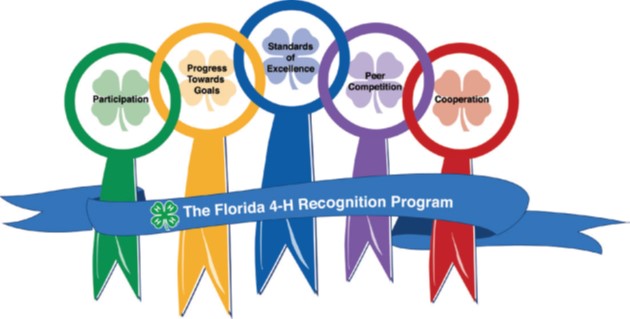
by Niki Crawson | Apr 17, 2020
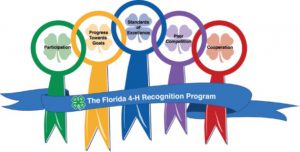 April’s 4-H Virtual Volunteer Leadership Academy on April 16, 2020 was on the importance of awards and recognition. We learned that recognition is important feedback that every individual needs as it helps to give a sense of belonging when a task or achievement occurs. Recognition builds self-esteem and allows for self-reflection and personal growth.
April’s 4-H Virtual Volunteer Leadership Academy on April 16, 2020 was on the importance of awards and recognition. We learned that recognition is important feedback that every individual needs as it helps to give a sense of belonging when a task or achievement occurs. Recognition builds self-esteem and allows for self-reflection and personal growth.
In 4-H, youth members, volunteers, parents, and community partners all want to know that they have been successful in their participation and/or contribution to the program and that they belong in 4-H. All members need to experience recognition for their efforts and that recognition is more meaningful when it occurs soon after it is earned. April’s 4-H Virtual Volunteer Leadership Academy webinar explained that the National 4-H recognition model is based on five areas for recognition: participation, progress toward goals, standards of excellence, competition and cooperation. It also shared helpful tips on creative, low cost ways of recognition that will still send a meaningful message of value and importance to members in the program.
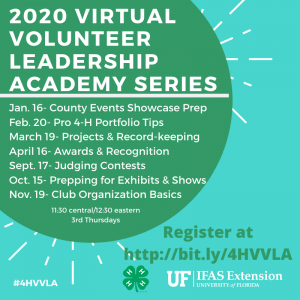 Registration Information
Registration Information
If you were unable to join us for April’s 4-H Virtual Volunteer Leadership Academy, it is not too late to register for future webinar sessions. And, as a registered participant, you will have access to all of the sessions available, including missed sessions, which can be viewed on demand.
Registration is required and can be found at http://bit.ly/4HVVLA Once registered, you can join each session live through Zoom. In addition, if you are unable to connect live, all monthly webinars will be available to you on demand as they are recorded. Register early – seats are limited to the first 100 registrants.
Future 4-H Virtual Volunteer Leadership Academy Webinars
- May – Club Tools for Online Use
- September*- Judging Contests
- October*- Preparing for Exhibits & Shows
- November* – Club Organization Basics
*Fall session registration will be available July 1, 2020.
Webinar Viewing Information
Join each live session simply with one click from your phone, tablet or computer, using the Zoom app. Once you have registered, you will receive email communication regarding the Zoom session links, dates and times.
4-H is one of the largest youth development programs in America with more than 6.5 million young people, ages 5-18, and 540,000 youth and adult volunteers. A variety of fun, educational, engaging activities are offered to teach the fundamental 4-H ideal of practical, “learn by doing” experiences which encourages youth to experiment, innovate and think independently. For information on how you can get involved with 4-H as a youth, volunteer, or supporter, please contact your local UF/IFAS Extension to learn about 4-H in your county.
Resources
by Heather Kent | Sep 28, 2017
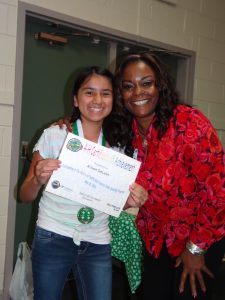 4-H Standards of Excellence are tools to help individual members and clubs set and achieve goals and are part of our recognition model. Recognition is an important part of the 4-H experience; it helps master skills and knowledge by providing feedback on progress towards goals. Standards of Excellence is one of my favorite ways to recognize youth and clubs. Here’s how it works:
4-H Standards of Excellence are tools to help individual members and clubs set and achieve goals and are part of our recognition model. Recognition is an important part of the 4-H experience; it helps master skills and knowledge by providing feedback on progress towards goals. Standards of Excellence is one of my favorite ways to recognize youth and clubs. Here’s how it works:
At the beginning of the 4-H year, youth decide which level of recognition they would like to receive. The levels are bronze, silver, gold and emerald. To help youth decide, they should review the Standard of Excellence matrix with their parent or club leader. The matrix outlines what a member needs to do in order to achieve each level of recognition. For example, if a junior member (ages 8-10) wants to achieve the gold standard, he/she would need to plan to do the following throughout the course of the 4-H year:
- Attend at least 2/3 of club meetings (or number established by club).
- Share project experiences by giving a presentation.
- Attend three different activities
- Participate in three different activities
- Participate in three community service activities
- Participate in four different competitions / exhibitions
- Complete two project record reports
- Teach one club level activity
- Make a poster on “My 4-H Experience” or submit Building My 4-H Portfolio
 But wait, that’s not all! 4-H Clubs can also achieve Standards of Excellence. During the club organizational meeting, members can choose which type of club they want to be (bronze, silver, gold or emerald), and build those requirements into their club plan (most of the items are things that clubs would want to do anyway, so why not be recognized for it?):
But wait, that’s not all! 4-H Clubs can also achieve Standards of Excellence. During the club organizational meeting, members can choose which type of club they want to be (bronze, silver, gold or emerald), and build those requirements into their club plan (most of the items are things that clubs would want to do anyway, so why not be recognized for it?):
- Bronze club- 12/20 items on the list
- Silver club- 14/20 items on the list
- Gold club-16/20 items on the list
- Emerald club- 18/20 items on the list
Once a member or club establishes their goal, they can submit their plan to their club leader. Towards the end of the 4-H Year, the member submits their application to their leader, who signs off on it and submits it to their 4-H agent. Youth are recognized during their County Achievement Night, or Awards Banquet.
Interested in helping? We need volunteers to serve as project mentors, review/judge awards applications or help plan annual recognition programs. Contact your local UF IFAS County Extension Office if you would like to get involved.
by Heather Kent | Mar 20, 2015
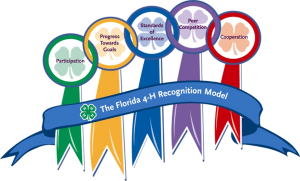
Florida 4-H Recognition Model
Recognition is a basic human need and can help build positive self esteem if handled in the right way and is an important part of the Florida 4-H Program. Whitney Cherry and Karen Miliffe shared tips for club leaders on showing recognition in 4-H clubs during the March Make a Difference Monday session earlier this month. If you missed it, you can view the recorded session at http://florida4h.org/madmondays.
Recognition is more meaningful when it occurs soon after it is earned and is related to a specific task. It can take multiple forms– appropriate recognition varies depending on age, past experience, family lifestyle, community and cultural heritage. Recognition motivates people to excel and take risks and in 4-H, it is the acknowledgement and affirmation of personal growth of an individual or group (such as a club). Awards are simply the things we give people or groups to symbolize our recognition of their accomplishments or effort.
The Florida 4-H Recognition Model includes five types of accomplishments or goals. The five types of accomplishments that 4-H measurers for recognition are:
- Participation in educational experiences (certificates, t-shirts, participation ribbons). The requirements for recognition for participation in a 4-H event are well publicized and easy to achieve. These types of recognition can be earned many times and are usually not expensive, but valued.
- Progress toward self-set goals. It is important for youth to learn to set goals and work towards them. 4-H project books are one way that we provide feedback on self-set goals. The club annual program is a tool for setting the collective goals of the club. As volunteers, we can assist youth with this by reviewing their goals frequently during the 4-H year, identifying what they have accomplished so far and helping them determine their next steps toward a goal.
- Achieving standards of excellence. In 4-H standards are used in two ways:
- Standards are established by subject matter and youth development specialists to provide a basis for young people to plan and work toward their goals
- Professional staff and /or volunteers and young people work together to establish standards– such as dress code at 4-H University, expectations of 4-Hers in club meetings, desired behavior at 4-H events/ camp
- Excelling in peer competition (judging contests, speaking contests, exhibits, animal exhibits and shows, portfolios, project book contests). Competition has long been a component in the 4-H program. 4-H strives to make competition an educational process and an opportunity to teach youth life skills. Peer competition is competing against one another’s peers. Numerous competition exist form the local club level, county, district, state, regional and national. 4-H also provides opportunities for clubs to compete against other clubs with the Club Standards of Excellence and Community Pride programs. Keep in mind that competition is not suitable for all ages (members 5-7 years old) and competition rules and procedures should be clear.
- Excelling in cooperation within a group (team or club awards or media recognition for service projects). From the beginning 4-H has encouraged young people to work together to learn. Cooperation engages young people in group experiences that are interdependent– face-to-face interactions, individual and group responsibility, group skills development. Cooperation involves everyone in the group and uses mutually agreed upon goals.
Recognition is a significant incentive to further learning. When properly used, it inspires young people to belong. Through caring adults and peers, in an inclusive and safe environment, recognition helps meets the needs of young people. Youth become and stay active in 4-H because they benefit. 4-H provides many opportunities for volunteers to make a difference in the lives of young people. If every young person could step into 4-H, imagine all the resourceful problem solvers, skilled workers, and capable leaders they’d become. That future is in our reach if we all lend our time and talents to guide the young people who will create it. Make the investment of a lifetime- become a 4-H volunteer, and inspire the next generation!

 April’s 4-H Virtual Volunteer Leadership Academy on April 16, 2020 was on the importance of awards and recognition. We learned that recognition is important feedback that every individual needs as it helps to give a sense of belonging when a task or achievement occurs. Recognition builds self-esteem and allows for self-reflection and personal growth.
April’s 4-H Virtual Volunteer Leadership Academy on April 16, 2020 was on the importance of awards and recognition. We learned that recognition is important feedback that every individual needs as it helps to give a sense of belonging when a task or achievement occurs. Recognition builds self-esteem and allows for self-reflection and personal growth. Registration Information
Registration Information


